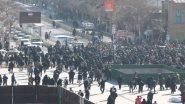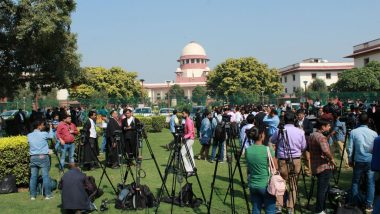New Delhi, January 22: The Supreme Court on Wednesday refused to pass any order of restraint against the Citizenship Amendment Act (CAA) and the National Population Register (NPR). The apex court issued a notice to the Centre and sought its response within four weeks. The court also said that a Constitution Bench comprising five judges will be formed to pass an interim order on pleas challenging the CAA. Why Citizenship Amendment Act+NRC Raise Fear And Concerns: A Multi-Dimensional Take.
On December 18, the court had sought the Centre's response by on nearly 60 pleas challenging the CAA's legality, which has swelled to over 140, and fixed the hearing on January 22. When Senior Counsel Vikas Singh urged the court to pass an interim order today itself, Chief Justice Bobde said: "We are not going to pass an ex parte order without the copy being served to the Centre." Why Assam and Neighbouring States Are Up in Protest Against Citizenship Amendment Act.
During the hearing, senior advocate Abhishek Manu Singhvi suggested that the petitions challenging CAA can be referred to a Constitution Bench. Another senior counsel Kapil Sibal intervened and suggested that in the meantime, the process of NPR may be postponed by a few months. Sibal's "stay" suggestion was opposed by Attorney General KK Venugopal.
On January 9, the apex court had refused conduct urgent hearing on a plea seeking that CAA be declared constitutional. The apex court had observed that saying the country is going through difficult times against the backdrop of violence in many states, and therefore the endeavour should be for peace.
The CAA grants Indian citizenship to non-Muslim minorities -- Hindu, Sikh, Buddhist, Jain, Parsi and Christian -- who migrated to India from Afghanistan, Pakistan and Bangladesh till December 31, 2014, following religious persecution. Many say the CAA and the yet-to-be-announced National Register of Citizens (NRC) together would discriminate against Muslims.
While non-Muslims left out of the NRC could be able to get citizenship under the CAA, Muslims who could not make the list may be deported or sent to detention centres. Protests have been going on in parts of the country since the Parliament approved the law.
(The above story first appeared on LatestLY on Jan 22, 2020 11:47 AM IST. For more news and updates on politics, world, sports, entertainment and lifestyle, log on to our website latestly.com).













 Quickly
Quickly


